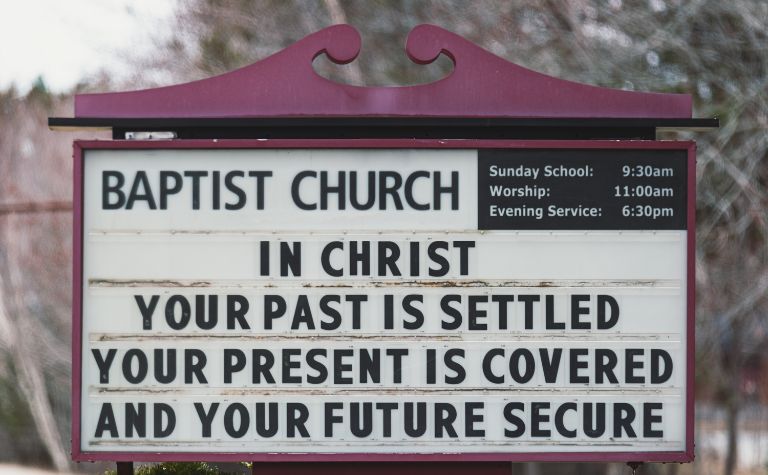Baptists denominations and churches comprise one of the largest branches of Protestant Christianity, and their leaders and members are passionate about theology. Original sin is controversial in the twenty-first century, so many people wonder what Baptists believe about it.
Baptists denominations and churches believe in the doctrine of original sin. It’s their conviction that the Bible teaches that people are sinful from birth. Their belief statements, historic confessions, and leading theologians and pastors have traditionally subscribed to and taught the doctrine for centuries.
How do Baptists define the doctrine, and how does it affect their ministries? What exactly do they believe about it? Are there some Baptist groups that don’t believe in original sin? Keep reading to learn more.
Also, see What’s the Difference Between Baptist and Foursquare? to learn more.

What Baptists Believe About Original Sin
The doctrine of original sin has multiple elements which address the genesis of the condition and the real-life impact of it. According to Baptist theology, original sin isn’t a historic theological position. It’s a reality that people experience and witness on a daily basis. (Also see Do Baptists Believe in Mortal Sin?)
Original guilt
This term describes the belief that all people, no matter their social standing, race, gender, or the time in which they lived, are born sinful.
Baptists see this reality in verses like Psalm 51:5 (captioned above) and Ephesians 2:3, which reads, “All of us also lived among them at one time, fulfilling the cravings of our flesh and indulging its desires and thoughts. Like the rest, we were by nature children of wrath.” (NIV, emphasis added)
Historically, most Baptists have believed that the consequence of being born sinful, without the redemption of Jesus Christ, results in eternal death. (Also see Do Baptists Believe Jesus is God?)
A small number of Baptists in history have challenged the idea that damnation is eternal, arguing instead that the unredeemed suffer temporarily and then cease to exist (this view is called annihilationism), but few have doubted that the Bible teachings of the doctrine of original sin. (Also see Do Baptists Believe in Cremation?)
Something many people wonder about Christianity is, Do All Denominations Go to Heaven? Follow the link to learn the answer to this important question.
Original corruption
The doctrine of original corruption is connected to the doctrine of original sin as it describes the real-life manifestation of the condition for all people.
That all people are “corrupt” states that every single person has an inclination toward sin and evil. Some theologians describe reality by saying all people are “bent” toward sin.
Sin is their natural tendency. Baptists see evidence of original corruption in verses like Genesis 6:5, “The LORD saw how great the wickedness of the human race had become on the earth, and that every inclination of the thoughts of the human heart was only evil all the time.” (NIV, emphasis added)

Total Depravity and Total Inability
Some Baptists theologians have emphasized the doctrine of Total Depravity and Total inability in their explanation of the doctrine of original sin.
- Total Depravity: This doctrine states that every part of a person is corrupt with sin. Sin has negatively and powerfully influenced all aspects of human nature in a thorough and “total” manner.
- Total inability: This doctrine states that a person cannot on their own change their sinful nature. Developing positive personal characteristics, like being kind or compassionate, can’t change their nature. Doing good deeds likewise can’t change a person’s corrupt nature.
Is there any hope for sinful people? Yes. Baptists, like other Christians, believe that God provided a remedy for the corrupt human condition when, out of an abundance of love for people, he sent the world Jesus Christ (John 3:16). (Also see Here’s What Baptists Believe About Salvation)
Through faith in Christ, people can become new creations. According to verses like 2 Corinthians 5:17, “If anyone is in Christ, he is a new creation. The old has passed away; behold, the new has come.” (ESV, emphasis added)
Baptists’ Confessions of Faith On Original Sin
A confession of faith is a statement of theological beliefs written and established by a denomination or a church. Such confessions articulate convictions on a variety of theological topics, including sin. Since the 17th century, Baptist groups have written confessions of faith. (Also, see Are Baptists Allowed to Dance?)
The statements below about what Baptists believe about original sin come from historic confessions made in Europe and the United States. Those listed are a representative sample of Baptists’ beliefs about the doctrine:
| Thomas Helwys Declaration of Faith (1611) |
| “Men are by nature the Children of wrath, (Ephesians 2:3) born in iniquity and in sin conceived. (Psalm 51:5). Wise to all evil, but to good they have no knowledge. (Jeremiah 4:22).” [1] |
| First London Baptist Confession (1646) |
| “Death came upon all, and reigned over all, so that all since the Fall are conceived in sin, and brought forth in iniquity, and so by nature children of wrath, and servants of sin, subjects of death, and all other calamities due to sin in this world and for ever, being considered in the state of nature, without relation to Christ” [2] |
| The Philadelphia Confession (1742) |
| “Our first parents, by this sin, fell from their original righteousness and communion with God, and we in them, whereby death came upon all; all becoming dead in sin, and wholly defiled in all the faculties and parts of the soul and body.” [3] |
| The New Hampshire Baptist Confession (1833) |
| “We believe that man was created in holiness, under the law of his Maker; but by voluntary transgression fell from that holy and happy state; in consequence of which all mankind are now sinners, not by constraint, but choice; being by nature utterly void of that holiness required by the law of God, positively inclined to evil; and therefore under just condemnation to eternal ruin, without defense or excuse.” |
| Baptist Faith and Message (2000) |
| “By his free choice man sinned against God and brought sin into the human race. Through the temptation of Satan man transgressed the command of God, and fell from his original innocence whereby his posterity inherit a nature and an environment inclined toward sin. Therefore, as soon as they are capable of moral action, they become transgressors and are under condemnation.” |

Liberal and Progressive Baptists
The term “Baptist” describes a number of different denominations and churches. There isn’t one unifying Baptist organization. Each Baptist group has its own organizing structure. For example, Southern Baptist has an organizing structure, and American Baptist Church has a different organizing structure.
This results in a variety of viewpoints: one Baptist church may be Reformed or Calvinist, while another may be Arminian; one may be premillennial, and another may be Amillennial; one may practice speaking in tongues, and another may not. (Also see Do Baptists Believe in Angels?)
Liberal and progressive movements: Like many Christian denominations today, some Baptists churches have adopted liberal and progressive theological beliefs on many doctrines, including original sin. Because the Baptist tradition values the local church’s autonomy, individual bodies of believers may express unorthodox views on sin.
The alternative view, which is reflected in many modern worldviews, and that liberal and progressive Baptists bodies have adopted argues that all people are essentially good from birth. What drives their conviction isn’t Scripture but present-day social values and norms. (Also, see What Bible Translation Do Baptists Read?)
References:
[1] Source
[2] Source
[3] Source
Related Questions
Baptist and evangelical churches are numerous in America, and the influence of each tradition has also spread to different continents and countries. As a result, many people have heard the terms...
Baptist denominations and churches, which date to the 17th century, comprise one of the largest branches of Christianity in the Western world. While Christian churches in Baptist networks and...
